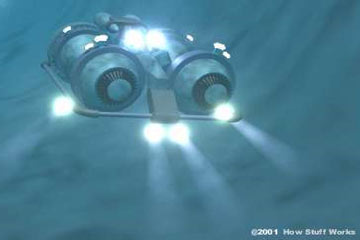
In our analogy, each person traveling by submarine is like a remote user accessing the company's private network.
Imagine that you live on an island in a huge ocean. There are thousands of other islands all around you, some very close and others farther away. The common means of travel between islands is via ferry. Traveling on the ferry means that you have almost no privacy: Other people can see everything you do.
Let's say that each island represents a private local area network (LAN) and the ocean is the
Continuing with our analogy, your island decides to build a bridge to another island so that people have an easier, more secure and direct way to travel between the two islands. It is expensive to build and maintain the bridge, even if the islands are close together. However, the need for a reliable, secure path is so great that you do it anyway. Your island would like to connect to yet another island that is much farther away, but decides that the costs are simply too much to bear.
This scenario represents having a leased line. The bridges (leased lines) are separate from the ocean (Internet), yet are able to connect the islands (LANs). Companies who choose this option do so because of the need for security and reliability in connecting their remote offices. However, if the offices are very far apart, the cost can be prohibitively high -- just like trying to build a bridge that spans a great distance.
So how does a VPN fit in? Using our analogy, suppose each inhabitant on your island has a small submarine. Let's assume that each submarine has these amazing properties:
- It's fast.
- It's easy to take with you wherever you go.
- It's able to completely hide you from any other boats or submarines.
- It's dependable.
- It costs little to add additional submarines to your fleet once you've purchased the first one.
Although they're traveling in the ocean along with other traffic, the people could travel between islands whenever they wanted to with privacy and security. That's essentially how a VPN works. Each remote member of your network can communicate in a secure and reliable manner using the Internet as the medium to connect to the private LAN. A VPN can grow to accommodate more users and different locations much more easily than a leased line. In fact, scalability is a major advantage that VPNs have over leased lines. Moreover, the distance doesn't matter, because VPNs can easily connect multiple geographic locations worldwide.
Next, we'll look at what constitutes a good VPN, including its benefits and features.


